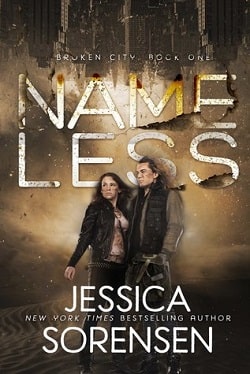Summary

Nameless (Broken City 1)
by Jessica Sorensen
I live in a world where freedom doesn't exist, and life is a battle for survival. Most people aren't even allowed to have names.
But I had a name once. I was Allura until the Wardens captured me.
They told me I was a Nameless. That I was no one, and my sole purpose was to obey them. And, for a while, I believed them.
I spent years living underground in the channels beneath the city, dreaming of being outside again. I never thought it would happen. That I'd die in the darkness of my cell.
But then three guys show up in the channels and my fate suddenly changes.
Blaise, Ryder, and Reece are part of a secret group working to take down the Wardens and help rescue the Nameless. For the first time in a long time, I feel like I might survive.
But the outside world isn't like how I remember. The city has become even more dangerous, especially for the Nameless. To survive, I'll have to learn how to trust the guys and live in a world full of crime where almost everyone is hunting for me.
.
Read
Nameless (Broken City 1) on http://kissnovel.net
Martial Peak Reviews
Jessica Sorensen's Nameless (Broken City 1) plunges readers into a dystopian world where identity is stripped away, and survival is a daily struggle. The narrative centers around Allura, a young woman who has been forcibly renamed a "Nameless" by the oppressive regime known as the Wardens. This gripping tale explores themes of identity, freedom, and the resilience of the human spirit, making it a compelling read for fans of dystopian fiction.
The story opens with Allura's bleak existence in the underground channels of a city that has become a prison for many. Sorensen's vivid descriptions of the dark, claustrophobic environment effectively convey the sense of hopelessness that permeates Allura's life. The author skillfully illustrates the psychological impact of living in a world where names—and by extension, identities—are taken away. This theme resonates deeply, as it reflects broader societal issues regarding autonomy and self-definition.
Allura's character development is one of the highlights of the novel. Initially, she embodies the despair of the Nameless, having internalized the Wardens' message that she is "no one." However, her encounter with Blaise, Ryder, and Reece marks a pivotal turning point. These three characters are not just love interests; they represent hope, rebellion, and the possibility of reclaiming her identity. Sorensen deftly navigates the complexities of Allura's relationships with them, showcasing her struggle to trust and open up after years of oppression. The dynamic between Allura and the three men adds layers to the narrative, as each character brings their own motivations and backgrounds into the mix.
The pacing of the novel is well-executed, balancing moments of intense action with quieter, introspective scenes. Sorensen's writing style is accessible yet evocative, drawing readers into Allura's emotional journey. The tension builds as Allura learns to navigate the treacherous outside world, where danger lurks at every corner. The stakes are high, and the sense of urgency is palpable, keeping readers on the edge of their seats.
One of the most striking aspects of Nameless is its exploration of trust and vulnerability. Allura's journey is not just about physical survival; it is also about learning to trust others after being conditioned to believe that she is worthless. This theme is particularly relevant in today's world, where many individuals grapple with issues of self-worth and the impact of trauma. Sorensen's portrayal of Allura's gradual awakening to her own strength and the importance of connection is both poignant and inspiring.
Furthermore, the world-building in Nameless is commendable. Sorensen creates a vivid and oppressive atmosphere that enhances the story's tension. The contrast between the underground channels and the chaotic city above serves as a powerful metaphor for Allura's internal struggle. The author also introduces various factions within the city, each with its own agendas, adding depth to the political landscape. This complexity invites readers to ponder the nature of power and resistance in a world where freedom is a luxury.
While the novel excels in many areas, some readers may find the romantic elements to be somewhat formulaic. The love triangle trope is prevalent in young adult fiction, and while Sorensen adds her unique spin, it may feel familiar to seasoned readers of the genre. However, the emotional stakes are elevated by Allura's personal growth, making her relationships feel more meaningful than mere plot devices.
In comparison to other dystopian novels, such as Veronica Roth's Divergent or Suzanne Collins' The Hunger Games, Nameless stands out for its focus on identity and the psychological ramifications of oppression. While those series also tackle themes of rebellion and survival, Sorensen's work delves deeper into the internal struggles of its protagonist, making it a more intimate exploration of the human experience in a broken world.
Overall, Nameless (Broken City 1) is a captivating start to a new series that promises to explore the complexities of identity, trust, and survival in a dystopian setting. Jessica Sorensen's ability to weave together action, emotion, and thought-provoking themes makes this novel a must-read for fans of the genre. As Allura embarks on her journey to reclaim her identity and fight against the oppressive Wardens, readers will find themselves rooting for her every step of the way. The book leaves a lasting impact, encouraging reflection on the importance of names, identities, and the power of human connection in the face of adversity.
























Reviews 0
Post a Reviews: